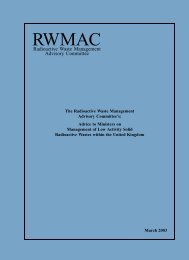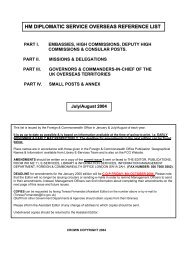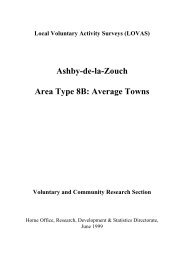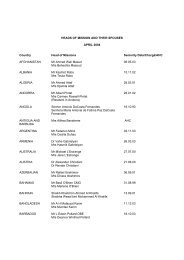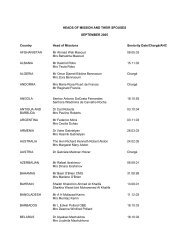A detailed guide to State Pensions for advisers and others
A detailed guide to State Pensions for advisers and others
A detailed guide to State Pensions for advisers and others
You also want an ePaper? Increase the reach of your titles
YUMPU automatically turns print PDFs into web optimized ePapers that Google loves.
6<br />
Introduction<br />
This <strong>guide</strong> covers most of the things people will need <strong>to</strong> know about their <strong>State</strong> Pension<br />
<strong>and</strong> we hope you will be able <strong>to</strong> use it <strong>to</strong> answer the following major questions:<br />
• What is a <strong>State</strong> Pension?<br />
• How <strong>to</strong> get a <strong>for</strong>ecast of <strong>State</strong> Pension entitlement?<br />
• How <strong>to</strong> qualify <strong>for</strong> a <strong>State</strong> Pension?<br />
• How is <strong>State</strong> Pension worked out?<br />
• How <strong>to</strong> claim <strong>State</strong> Pension?<br />
• What happens after claiming <strong>State</strong> Pension?<br />
(People who need individual in<strong>for</strong>mation about their <strong>State</strong> Pension should<br />
contact us.)<br />
What is a <strong>State</strong> Pension?<br />
The <strong>State</strong> Pension is payable at <strong>State</strong> Pension age <strong>and</strong> is based on a person’s<br />
record of National Insurance contributions <strong>and</strong> credits. In some circumstances, we<br />
may use the record of contributions or earnings of a husb<strong>and</strong>, wife or civil partner<br />
or a late or <strong>for</strong>mer husb<strong>and</strong>, wife or civil partner <strong>to</strong> work out how much <strong>State</strong><br />
Pension a person may receive.<br />
[SSCB Act 1992 Part ll]<br />
The <strong>State</strong> Pension has several parts – a person may qualify <strong>for</strong> more than one<br />
part. For example, if a person is aged 80 or over they may get a basic <strong>State</strong><br />
Pension, Graduated Retirement Benefit, an additional <strong>State</strong> Pension <strong>and</strong> an age<br />
addition. These four parts will, <strong>to</strong>gether, <strong>for</strong>m their <strong>State</strong> Pension.<br />
How does someone qualify <strong>for</strong> a <strong>State</strong> Pension?<br />
A person builds up their National Insurance record over their working life. From<br />
the age of 16 onwards a person will build up a record of earnings, payments <strong>and</strong><br />
credits <strong>to</strong> the National Insurance scheme.<br />
This record is the basis on which we will work out the <strong>State</strong> Pension.<br />
If the person marries or <strong>for</strong>ms a civil partnership they may be able <strong>to</strong> use their<br />
husb<strong>and</strong>’s, wife’s or civil partner’s National Insurance record <strong>to</strong> help complete<br />
their own record <strong>and</strong> so help them qualify <strong>for</strong> a <strong>State</strong> Pension. They may be able<br />
<strong>to</strong> use the record even if their husb<strong>and</strong>, wife or civil partner has died or if their<br />
marriage ended in divorce or annulment or their civil partnership ended in<br />
dissolution (legally ended) or annulment.<br />
To get a <strong>State</strong> Pension, the person must have reached their <strong>State</strong> Pension age<br />
(currently 60 <strong>for</strong> a woman born be<strong>for</strong>e 6 April 1950 <strong>and</strong> 65 <strong>for</strong> a man1 ) <strong>and</strong> meet<br />
the contribution qualifying conditions.<br />
[SSCB Act 1992 section 122 (1)]<br />
1 The <strong>State</strong> Pension age is changing. The changes begin in April 2010 – see pages 18 <strong>to</strong> 21.



